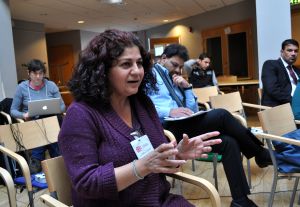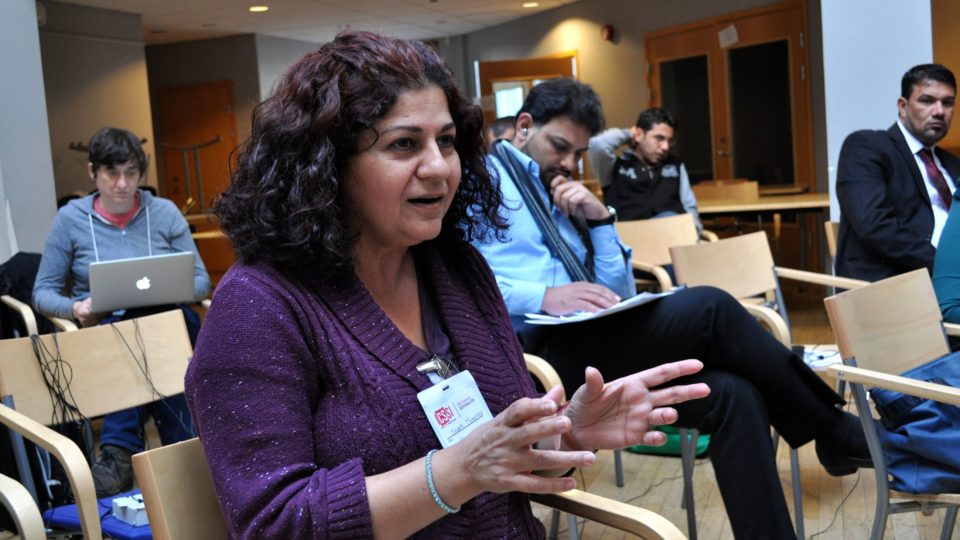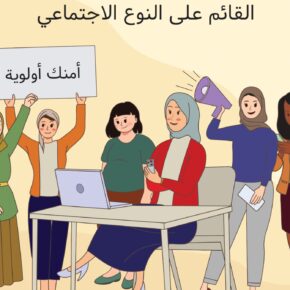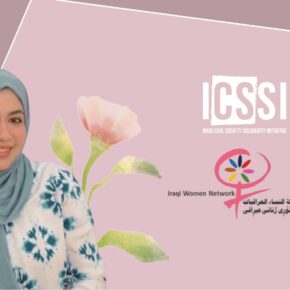The Situation of Iraqi Women Facing Both State Repression and the Brutality of Daaesh
Yanar Mohammed
President of the Organization of Women’s Freedom
Paper Prepared for ICSSI Conference
Oslo – Norway, October 2014
Currently, Iraqi women find themselves confronting challenges that are unprecedented in Iraq’s modern history. As the government and the opposition parties controlled by Islamist groups compete with each other in barbaric practices of insulting and disrespecting women, Daaesh organizations treat the women of the cities they occupy like slaves, who are being openly bought and sold. Women’s very humanity is being attacked and eliminated. We have seen some of the Islamist parties that shared in the political power claim as their highest achievement sending to the parliament for consideration a draft law (Al-Jaafari Law) that would permit marriage of female children as young as nine years – what amounts to legalized rape of these young girls. The political party behind Al-Jaafari Law has worked to keep the Ministry of Justice under its control in order to impose their conservative policies on Iraqi families and transform the women of Iraq into virtual slaves inside their own homes. This happens within the corridors of the new Council of Ministers and with the praise and approval of the state’s highest officials. In spite of all the objections expressed by organizations and individuals to Al-Jaafari Law, this draft legislation still poses real danger; conservative forces are merely waiting for the right moment to once again bring the law back for discussion.

President of the Organization of Women’s Freedom – ICSSI Conference
Oslo – Norway- 2014
These abuses are occurring in a country that knows no peace. Iraq lacks the ability to oppose these attacks on women, which were imposed after decades of successive wars that left two million widows and five million orphans across the nation. Many of these orphans have been swept up as child soldiers in the wars fought by militias. Others have been treated as commodities to be bought and sold in local slave markets and then sexually exploited for the gratification of persons of influence and power, who have no respect for life and human dignity.
Every day new militias, supported by the government, are formed in the capital; the recruiting of young men and boys is never ending. No neighborhood in Baghdad is free of houses where girls and women are exploited by warlords and politicians. With this continuous recruitment of young males and the exploitation of girls, the poverty and suffering of youth has become extreme. At the same time, members of the ruling class and the warlords who are able to control the wealth of the society grow rich. Corruption has become the norm in the management of this wealth. Efforts to criticize the situation or change these practices are impossible, since the armies that have been formed all work to suppress and crush the rights of any people who object.
It is no secret that the Iraqi parliament’s process of decision making does not serve the interests and rights of Iraq’s citizens and is not intended to relieve citizens’ suffering. The political process, as created by the American occupation forces, is a system that ensures the division of Iraqis into Shiites, Sunnis, Arabs, Kurds, Turkmen, and other religious and ethnic groups. These groups are not based on a political, economic or social agenda, but only on the representation of ethnic or religious identities at the expense of other concerns. As the polarization of society along religious, ethnic and sectarian lines deepened, every religious political party formed its own militia that exercised power over its own territory. Iraq became a “ticking time bomb” divided into warring factions as we now see in the western, southern, and the Kurdish areas. Only the capital, Baghdad, retains a diverse, Iraqi identity. The lion’s share of the militias were Islamist groups; they and their related political parties took control of the society and imposed their conservative practices and laws over all Iraq’s citizens. They began asserting their dominance by trying to enact the infamous, anti-women, Al-Jaafari law. As a result of these divisive policies, one-third of Iraq suffered extreme sectarian discrimination under al-Maliki’s government. That repression paved the way for Daaesh to then take control of these parts of the country.
We celebrate and regard with the greatest respect the Iraqi women who endured all the tragedies of the last decade: those who lost their loved ones in sectarian war, all women who were bought and sold, and those still being bought and sold by the dealers of Daaesh. Women have had to watch their husbands or fathers being slaughtered by Daaesh and their daughters kidnapped into a miserable fate.
Iraqi society would not have been vulnerable to a civil war of this nature without the U.S. occupation policies that turned Iraqis into enemies of one another on sectarian, religious, and ethnic bases. It is totally inadequate to point out that genocide is occurring in Iraq before the eyes of the international community, but rather we must assert that the international community, in particular those coalition countries supporting the United States, are fully responsible for what is happening to the Iraqis. Their support for the divisive policies of the occupation empowered the Islamist groups and turned Iraq into a nation more devastated by terrorism than any other country in the world.
Types of Abuses of Women
In Mosul: Iraqi society witnessed on the tenth of June the greatest evidence of the failure of the political system (imposed during occupation) when the second largest city in Iraq was turned over to Daaesh (a small organization at the time) without any resistance. As a result of this fall, two million civilians now live under Sharia law, where the cutting off of a hand or head is a penalty accepted by officials. Persecution of Christians, including theft of their property became an acceptable political practice. And for the first time in the modern history of Iraq, a “slave market” was opened, where captive Shia, Turkmen, Yazidi, and Christian women are sold. Slavery returned to Iraq, devastating hundreds of women who were treated as merchandise or spoils of war. At a time when Daaesh members were slaughtering civilians in Iraq and cutting off their hands and heads, they continued to receive financial and logistical support from countries in the regional that are allied with the U.S. and European nations; and, extremist Islamist leaders were holding meetings in European countries and being accorded legitimacy and credibility. It was a repeat of the international community’s arrangement with the state of Israel, which is given respect during and after the massacre of thousands of Palestinians in Gaza.
In Tal Afar: A week after the fall of Mosul, dozens of women from the “Shiite Turkmen” witnessed the killing of their husbands and sons by warriors of Daaesh who targeted police and military personnel from the Shiite community. In many cases they kidnapped the young women to an unknown fate after their detention in schools, while they kidnapped old women to be used as human shields at the airport and in public buildings. The fighting and intense bombardment of Tal Afar resulted in the displacement of at least one hundred fifty thousand residents from their homes in a state of devastation. They endured further hardships as they passed the Khazer checkpoint on their way south through Kurdistan.
The Daaesh fighters informed the people of Tal Afar who remained behind, that each clan must give five of its daughters to marry the fighters as the price for staying in the city. Thus, they imposed conditions of rape and humiliation on many women in Tal Afar and in Mosul.
In Sinjar, the extent of the brutality of Daaesh was clear in their dealing with those they consider as “non-humanity monotheists”. After giving them a few days to embrace and convert to Islam, they then slaughtered men and carried away hundreds of women to the slave markets in Mosul, Reqqa, and other places. Some of the women were given to the princes of Daaesh.
In the cities in the western region that are occupied by Daaesh – Tikrit, Alalam, Ramadi, Fallujah, etc. – Daaesh targeted those who previously served in the police and security institutions. They carried out the death penalty without trials. In the village of Alzlaah on the Tigris, Ms. Sana Saeed witnessed an attack by Daaesh fighters on her house; they dragged her husband and son to the garden where they cut off their heads and put them on their chests in front of Ms. Sana and her three shocked daughters, who shrieked in horror. But the area was depopulated; everyone had fled from Daaesh injustice and the city was a ghost town. Sana and her three daughters remained sitting and weeping over the bodies of the father and son until the next morning when some relatives finally came to rescue them. Sana is not alone in having endured such a dreadful experience; dozens of women in the western region encountered and still encounter similar horror and suffering.
In the non-occupied cities of the western region, like Samarra, people defended their city from dozens of Daaesh’s attacks and kept the city safe. But, they are currently suffering from attacks by Shiite militias sent by the State, especially the “Popular Mobilization”, the “Headbands of Right,” and “Badr Forces”. These militias deal with people in a highly sectarian fashion, burning their homes and arresting the young on the pretext of taking revenge for the Spyker massacre carried out by Daaesh. Despite the fall of one-third of Iraq’s territory into the hands of the territorial beasts of Daaesh, the Iraqi government and its militias are still employing the same sectarian political practices that paved the way for Iraq to be overrun and occupied by Daaesh.
In the south, an atmosphere of terror spread after the fall of Mosul and the discovery of the falsehood that “two million of the army is able to protect the state’s cities”. It became clear that Iraq is ruled by religious institutions, which launched an invitation for “jihad”, without any guarantee that this “jihad” would not lead to civil war. Every home in the center and the south watched as their young men were sent off to a new raging war of militias without proper training. In many cases, these young men ended up victims of genocide, like that most heinous massacre, Spyker, images of which were spread across the screens of social media.
In Baghdad terror reigns because of the psychological media war from inside and abroad about the possibility of the fall of Baghdad to Daaesh. The Shiite Islamic militia, whose number has doubled to more than a dozen, now trample the community as they please with impunity. Perhaps the most powerful example of this was the sexual assault and subsequent killing of 32 women and men, in the Ziyouna neighborhood of Baghdad, in the middle of July 2014.
Women’s Resistance to Daaesh
The world commends the model of the militant, feminist resistance of Kobanî who fought against Daaesh attacks, following the PKK tradition of organizing for resistance. They demonstrated how a unified public will not allow brutal forces to eliminate humanity. What hasn’t been acknowledged and focused on is the resistance of women in other Iraqi cities, in particular the model in Amerli where peasant women lifted weapons and machine guns against the attacks of Daaesh for many weeks and eventually overpowered them. One women in Dhuluiya in Alam township “Umaimah Naji” fought to protect her town and killed three of Daaesh fighters before she herself was killed.
Despite the fact that resistance to Daaesh in Kobanî was different from other cities in the western region of Iraq, everywhere there is evidence of the fact that Iraqi women are capable leaders, in the face of oppression aimed at marginalizing them. Despite the dual sectarian and gender repression that women of the western region suffered, their willingness to defend their communities wasn’t less than that of those who enjoyed wealth and leadership positions within the community. This proves that the discriminatory laws of the state and the oppressive practices cannot discourage Iraqi women’s desire to defend the freedom of society. The model of Umaimah Naji in fighting will remain as a powerful symbol of this desire and commitment.
The Resistance of Women and Women’s Organizations to the Excesses of Al-Fatheela Party and Others: Al-Jaafari Law
Perhaps, the gravest danger that women confront – with the exception of Daaesh attacks – is the so-called “Al-Jaafari” Law, which has been written by one of the leaders of Al-Fatheela Party when he was a Minister of Justice in the previous government. Civil society institutions did not take this matter seriously at first, because the law was so archaic and barbaric; it seemed incomprehensible. The law permits the marriage and divorce of girls nine years old; it also gives religious leaders the authority to decide who is “healthy and eligible” to marry. The law does not respect a woman’s humanity or her right to be protected from rape and other physical and moral transgressions. However, the Council of Ministers dared during the administration of the former Prime Minister to approve this law and turn it over to the Parliament.
Although many people are now praising Iraq’s new government, they ignore that the new Prime Minister has selected yet another leader of Al-Fathella Party to be in charge of the Ministry of Justice. This is evidence that the new government’s priorities do not lie in respect for women’s rights, but that it is willing to tolerate contempt for women as an acceptable price for satisfying political quotas.
Feminist organizations have demonstrated their competence and ability to rise up in opposition to this disgraceful law; but the law is still on the table and we cannot entirely rule out that it may be implemented. It is also worth mentioning that the state maintains it has the right to charge the heads of NGOs just as it charges terrorists; according to the NGO law, the state can imprison officials of organizations whose goals and policies are contrary to the government’s instructions and practices.
The Fight to have Freedom of Opinion and against the Closure of the “Equality Radio” after the Fall of Mosul:
After the Organization of Women’s Freedom launched a campaign to oppose Al-Jaafari law, starting in 2014 on the eighth of March, International Women’s Day, we expected criticism and governmental efforts and procedures aimed at silencing us. It didn’t take long. Some government officials even took advantage of the fall of Mosul in the process, invoking the terrorist threat as the reason to close down many satellite channels and radio stations, including our “Equality Radio Station” 103.8 FM. They also resorted to procedural tactics like refusing registration papers as a way to silence our broadcasts. Although we completed the registration requirements, they did not allow us to resume broadcasting, and threatened us with fines and confiscation of equipment if we did broadcast our programs.
It is known that the Media and Communications Committee is one of the more repressive operations of this political era. It works to support the Islamist and militia parties, and opposes personal freedoms and particularly secular women.
The Role of the International Community
The brutality of Daaesh is in many ways matched by the sectarian policies of the Iraqi government, especially by the continuous torture that tens of thousands of young people suffered in state prisons, which are managed by Shiite militias, with the knowledge of the American government. The formation of the Daaesh organization followed as a natural result of the placing of Shiite Islamist parties in position to rule the state by the American government and the international coalition. The Iraqi government would not be able to maintain these sectarian policies if the international community opposed them, and supported non-Islamist parties to build and govern the state.
It is no coincidence that America’s allies in the region are the biggest supporters of Daaesh: wounded Daaesh fighters are getting treatment in Turkish cities; their organizations meet openly inside Turkish territory. It is also no secret that the Turkish state cannot breach European and American allies’ orders, because of the dependence of their economy and their policies on these nations. The time has come for the international community to stop the double standards in dealing with States; since they disparage Daaesh practices one moment, but they do not take serious action against them. After the multiple cases of genocide, the uprooting of communities, the Americans decide that they respect the independence of Iraq and they will not interfere in the situation of independent states on the ground, but employ only aerial bombardment. After they left behind the resources that allowed Daaesh to grow, America reaps the benefits of its colonial approach, which is aimed at crushing the people by making one half of the population the enemy of the other half. This approach, which seeks to ruin the region, must be stopped; watching a sectarian war burn and destroy everything is unacceptable. Equally unacceptable is to allow the Islamist parties to oppress women and society through laws that are also part of a colonial framework and approach. This must be stopped, along with ending support for the current Islamist parties. It is time to make way for citizens and liberal people to take the reins of the Iraqi State and society in their hands.





